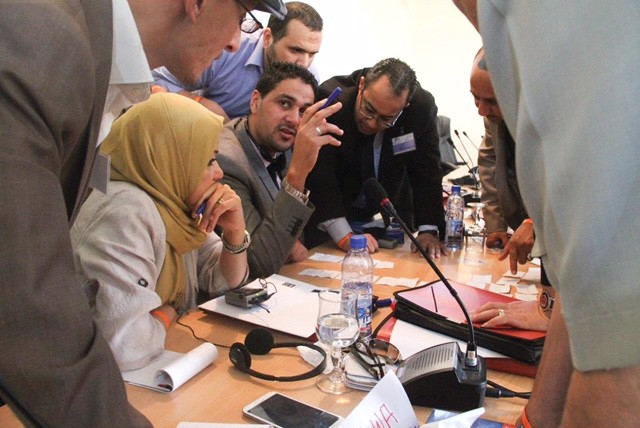
The United States Agency for International Development (USAID) supports Libya’s transition to a democratic and peaceful nation. USAID works with civil society, municipal councils, national government, entrepreneurs, and a range of civil society groups, including those representing women and marginalized communities, in their efforts to improve Libyan lives. These partnerships help improve citizen confidence in Libya’s government, both national and local, and support the ongoing democratic transition.
Our Work
In 2011, the regime of Muammar Qadhafi responded to protests in eastern Libya with violence, leading to a popular revolution that brought his 42-year regime to an end. Three years later, armed conflict broke out after the second parliamentary elections, leading to political divisions and an intense conflict between supporters of parallel state institutions. In this context, USAID’s efforts focus on strengthening the country’s representative governing bodies, independent institutions, and civil society to navigate their transition into a more democratic and prosperous Libya that is capable of utilizing its human, financial and natural resources for the benefit of all Libyans.
DEMOCRATIC TRANSITION
Despite the political conflict, USAID continues to provide an array of targeted assistance to build support for and enhance confidence in a stable, democratic Libyan government. This includes support for credible, transparent and inclusive electoral, political, and governing processes in Libya. USAID is helping to strengthen the ability of civil society and citizens to participate in the creation and adoption of a new constitution and the conduct of fair and peaceful elections, as well as helping make citizens’ voices heard in the decisions of their government. In areas recovering from recent conflict, USAID is supporting community reconciliation and recovery through community engagement, municipal council strengthening, and small scale infrastructure repair. Nationwide, USAID is supporting Libya in its efforts at building effective national institutions that respond to community needs, strengthening public outreach, and creating social and economic conditions necessary for Libyans’ well-being
NATIONAL GOVERNANCE
USAID assists the Libyan government to increase its capacity and improve transparency, public financial management, and external communications through strategic assistance and increased public engagement, including by embedded technical advisors in key ministries. USAID supports organizations that represent women and other marginalized and minority groups to contribute to national policy-making processes.
MUNICIPAL GOVERNANCE
USAID works in 19 municipalities in Libya covering 75% of the population, and supports nascent municipal councils to become more capable of fulfilling their roles and responsibilities in addressing constituents’ concerns. USAID also helps local government to increase revenue generation and build linkages with national-level government bodies to make decision-making more inclusive.
NATIONAL DIALOGUE
USAID, partnering with local non-governmental organizations (NGOs), continues to support national dialogue and consensus building among different segments of Libyan society. USAID supports the work of the Constitutional Drafting Assembly (CDA) with expert legal professionals and by supporting the input of women’s rights activists, the disabled community, and other minority groups into the drafting process. USAID is also supporting communication efforts nationwide regarding the draft constitution and its contents and other civic topics of discussion to build public awareness and a more engaged citizenry.
TRANSPARENT AND INCLUSIVE ELECTORAL PROCESS
USAID, along with its partners, provides election related technical support and advice to Libyan government institutions including the High National Electoral Commission, on voter registration and education, electoral dispute resolution, and out-of-country voting. Additionally, USAID increases access and awareness for people with disabilities in the electoral process and is assisting in drafting an electoral law.
WOMEN’S ECONOMIC EMPOWERMENT
USAID supports women with the aim of releasing the under-utilized potential of women’s entrepreneurship, a cornerstone of economic growth and political stability. USAID has supported a series of leadership trainings and networking events, has provided grants to businesswomen, and has built a business development support portal that entrepreneurs can access to improve their skills.







Comment
Make a general inquiry or suggest an improvement.